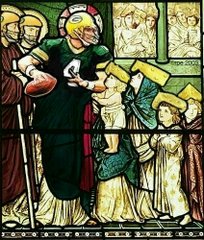Martin Luther considered music to be second only to God’s Word amongst the treasures in the world. He writes: “Beautiful music is the art of the prophets that can calm the agitations of the soul; it is one of the most magnificent and delightful presents God has given us.”
Now in my thirteenth year as pastor of God’s people at Trinity Lutheran Church-Missouri Synod in Layton, Utah (
http://www.trinitylayton.org/), it has been my experience here and observation of fellow Lutheran pastors hither and yon that there is no issue that is as near and dear to the people--or as troublesome to the relationship between under-shepherd and flock--as that of church music and hymnody.
It all boils down to whether the music of our liturgy and hymnody is going to flow from the passion that sings about our faith based upon feeling of our hearts, or from our confession that sings The Faith once delivered to us by the Holy Spirit through the prophets and apostles of our Lord Jesus Christ.
As sinners, both the layman and the pastor are pietists and enthusiasts at heart. That is, our deepest desire is to express for ourselves, show each other, and prove to God how much we love Him. In the case of the pastor that desire is complicated and magnified by the desire to please our people and be admired by them—not to mention the fear of rejection and the possibility of losing members and even the salary by which we are supplied our daily bread and support our families.
So the worshipper’s inclination is to desire and demand music that gives us the opportunity to do the former.
But recalling Luther’s regard for the Word of God as the highest treasure, which itself proclaims “faith comes from hearing, and hearing through the word of Christ [Romans 10:17],” as much as Luther himself loved music, I am certain he would be adamant that the music of our liturgy and hymnody must always be in harmony with and take second seat to the right proclamation of the Word no matter if even an angel from heaven were to demand otherwise or take offense. As Luther has also written, “Accursed be the love and harmony for the preservation of which men endanger the Word of God.”
Lest you think I am merely being contrarian and picking at nits in this matter of church music, you will have to argue with C.F.W. Walther on this one as well.

When another Lutheran pastor asked him whether it was advisable to introduce the singing of Methodist songs in a Lutheran Sunday School, this founding father and first President of the Lutheran Church-Missouri Synod replied in part:
No, this is not advisable, rather very incorrect and pernicious.
1. Our church is so rich in hymns that you could justifiably state that if one were to introduce Methodist hymns in a Lutheran school this would be like carrying coals to Newcastle. The singing of such hymns would make the rich Lutheran Church into a beggar which is forced to beg from a miserable sect. . . .
2. A preacher of our church also has the holy duty to give souls entrusted to his care pure spiritual food, indeed, the very best which he can possibly obtain. . . . If the preacher claims, that he allows only “correct” hymns to be sung, this does not excuse him. For, first of all, the true Lutheran spirit is found in none of them; second, our hymns are more powerful, more substantive, and more prosaic; third, those hymns which deal with the Holy Sacraments are completely in error; fourth, when these little sectarian hymnbooks come into the hands of our children, they openly read and sing false hymns. . . . . *
If he wrote this about what was being sung by Sunday School children from the Methodist hymnody of a century and a half ago, in which we find such favorites as “Rock of Ages” and “Nearer, My God, to Thee,” what would he have to say about including a song written by Twila Paris in our Lutheran Service Book, employing the monastic music of Taizé, or using the latest pop Christian hits in the Divine Service?
Perhaps this little illustration will help you understand what could be so troublesome and injurious about our use of the hymnic and liturgical music of other Christian church bodies.

About a month ago, we were having a new used organ installed here at Trinity. We have a little storefront church in a strip mall next to the Gold's Gym in Layton, UT, with the usual double glass door entrance. While the man was busy installing and testing the instrument I walked out of my office and noticed a sparrow perched on the sidewalk about three feet away from the door. He couldn't have been more than three inches tall. Since his tiny little body was facing east, he had his head cocked so he could look into the building. I stood right there at the door for a couple of minutes staring at him. He didn't seem to be aware of, let alone threatened by my presence.
At first I thought he might be injured, or too cold to fly, or some such. So I opened the door and stepped out and he still didn't flinch or even blink. I stepped within an inch of his little beak before he actually moved and flew up to the rafters above.
My conclusion? I am virtually certain the poor little birdie was captivated by the musical notes he was hearing as the installer tested the high notes to the point of being hypnotized.
I think there is a lesson for us in this about church music. Just like the little sparrow, music is a powerful force for us as Luther has noted (inadvertent pun) in the positive sense. But if we are so hypnotized by the music that we become blissfully unaware of the text (i.e. message) or context (i.e. schismatic origin) of the music, our faith can become as vulnerable as the little birdie I could easily have booted into oblivion as it was transfixed before me that cold, winter day.
Perhaps, Luther and Walther perceived the possibility and probability of just such a vulnerability and risk to the unsuspecting flocks of God’s people when they insisted that our confession of God’s Word remain pure and unadulterated even and especially when it is accompanied by the power of music.
Lord give us faithful pastors and laymen to uphold them in resisting the passion of our sinful hearts and maintaining the right confession of The Faith in the liturgy and hymnody of our Church Music in the LC-MS.
* Walther’s letter of response can be found in it’s entirety at
http://www.angelfire.com/ny4/djw/lutherantheology.walthermethodist.html Greetings fellow followers of Christ Jesus!
Greetings fellow followers of Christ Jesus!











